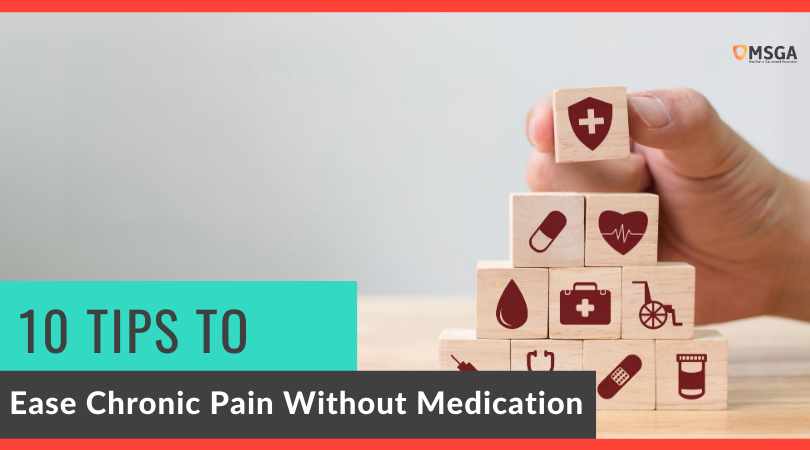Chronic pain isn’t an easy condition to handle, but you can take control. Simple changes in your lifestyle, diet, and exercise routines can help ease your pain.
Try these techniques to experience relief:
Manage stress. Stress can increase chronic pain and make it more difficult to manage. Try a variety of strategies to relax and reduce stress to see which ones work the best for you.
-
- Yoga and meditation are two stress-reduction strategies that can help.
Try breathing exercises. By simply focusing on your breathing, you can relax your muscles and reduce pain. Deep breathing exercises can also reduce blood pressure, eliminate stress, and decrease the heart rate.
Find fun distractions. Instead of concentrating on the pain, try distractions that help you forget about it.
-
- Hobbies and activities such as watching your favorite movie or reading a new book can help. You may also want to try drawing or other ideas that help you fill your time and avoid thinking about the pain.
Increase your water intake. Dehydration can make chronic pain worse.
Avoid inflammatory food. Fast food and processed food can increase inflammation in your body, so your chronic pain also increases. Foods with a lot of sugar and salt also contribute to inflammation and increased pain.
Add more anti-inflammatory food. Options such as, nuts, leafy greens, fatty fish, berries, and other items can help you fight inflammation and reduce pain. They have antioxidants that fight damage on the cellular level.
Focus on posture. Posture can help reduce the stress on your back and cut down on chronic pain.
-
- Consider the way you sit and stand. Experts recommend that you avoid slumping your shoulders and lowering your head. The spine should be straight, so circulation is better.
Discuss your health. Researchers have found that talking about your health can reduce pain. The American Psychological Association points out that talking about your pain can help you discover management techniques.
Try massage. Massages can reduce chronic pain by improving circulation and blood flow.
-
- Massages help reduce back, shoulder, and neck pain. They can also help your overall health.
Find support. Health experts recommend finding support groups that focus on chronic pain. These groups give you the chance to meet others who suffer from chronic pain.
-
- They can offer advice and tips for managing pain. They can also provide doctor and clinic reviews or recommendations. By talking to others who have chronic pain, you can learn new techniques to deal with your pain.
- Chronic pain is linked to anxiety and depression. The social aspect of support groups can also help in coping with these side effects.
- Support groups are less formal settings, and online groups offer privacy and anonymity, so you can feel comfortable sharing your experience.
Even if you take medication for your pain, you can further reduce it with these techniques. Follow your doctor’s advice, reduce stress and inflammation, and find support, and you’ll feel the pain relief you’ve been seeking.

